China is the world’s largest emitter of harmful greenhouse gasses. So the news that the country is currently building dozens of new coal-fired power plants is a cause for concern. However, the massive addition of new power plants does not necessarily mean a turn away from climate action and a rapid increase in Chinese emissions, analyses Nico Beckert.
More power plants naturally increase the risk that Beijing will miss its own climate targets. But a new study suggests that China’s specific situation will prevent the worst from happening. For example, many coal-fired power plants are already underutilized, and some projects serve primarily as employment programs for the ailing construction sector.
Infrastructure projects such as power plants are also characteristic of the Chinese Belt and Road Initiative (BRI), also known as the New Silk Road. China uses this mammoth project to fund projects all over the world – including in Europe. Most of these are stand-alone projects, but in 2019 Italy became the first and only G7 country to sign a cooperation deal with the BRI.
The new Prime Minister Giorgia Meloni, however, is not a fan of the infrastructure program. She plans to quit the partnership with China, reports Amelie Richter. The decision is expected later this year.

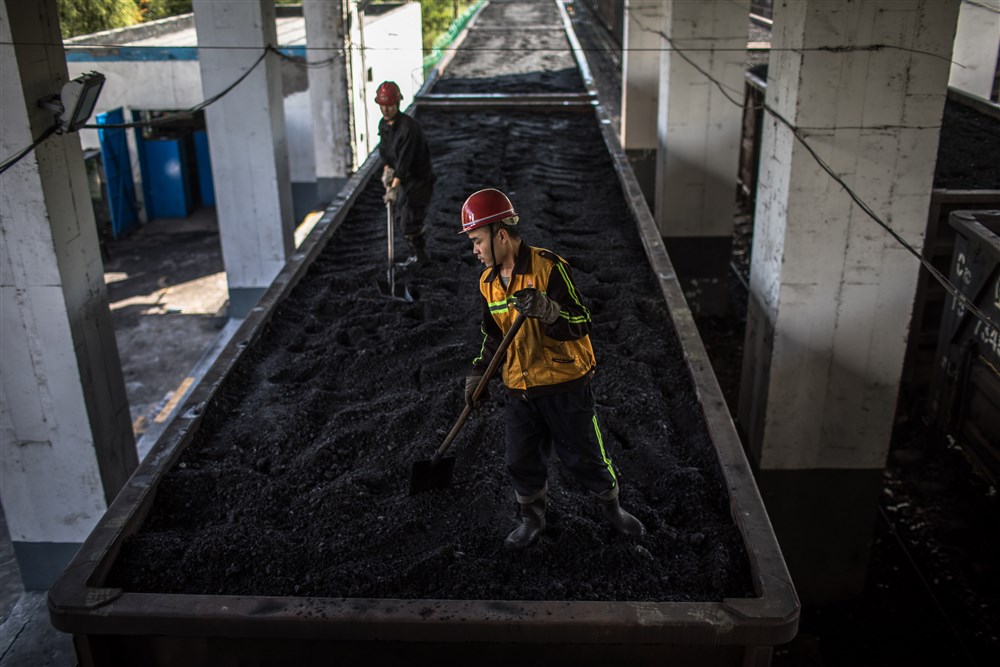
It is a construction boom that is unimaginable by Western standards. In 2022, China started building a new coal-fired power plant every week on average: The construction of 50 gigawatts of new power plant capacity has commenced. In total, the authorities approved coal-fired power plants with a capacity of 106 gigawatts last year, about 100 large coal plants. A fourfold increase compared to 2021, according to a new study by the Global Energy Monitor (GEM) and the Centres for Research on Energy and Clean Air (CREA). In the same period, only 4.1 gigawatts of power plant capacity were decommissioned.
This construction boom sounds like a killing blow to China’s climate goals, and it also puts international efforts in jeopardy. China’s President Xi Jinping promised a decrease in coal consumption starting somewhere between 2026 and 2030. At first glance, this hardly seems possible given the massive expansion of power plant capacity. But the situation is not that simple. “The massive additions of new coal-fired capacity don’t necessarily mean that coal use or CO2 emissions from the power sector will increase in China,” the study’s authors write.
Some factors unique to China speak against a sharp increase in carbon emissions:
Nevertheless, the construction boom does not come without climate risks. More than 100 new coal-fired power plants “will make meeting China’s climate commitments more complicated and costly”, the GMA-CREA study concludes. The coal industry has great political influence. It directly or indirectly provides several million jobs and is one of the largest taxpayers in some provinces.
The authors of the study fear that in the worst case, the new coal power plants will be fully utilized and will slow down the expansion of renewables. This could sharply increase China’s emissions. The political leeway for this does partly exist.
Although Xi Jinping has promised to reduce coal use and reach the carbon peak in 2030, the absolute level of carbon emissions has not been defined. At the same time, the leadership is aware, however, that meeting the long-term climate goals will be harder to achieve if emissions continue to rise sharply until 2030.
The new coal-fired power plants, however, do not only function as an economic stimulus program to achieve rapid growth and support the country’s ailing construction sector. Another argument for the construction boom is to secure the energy supply:
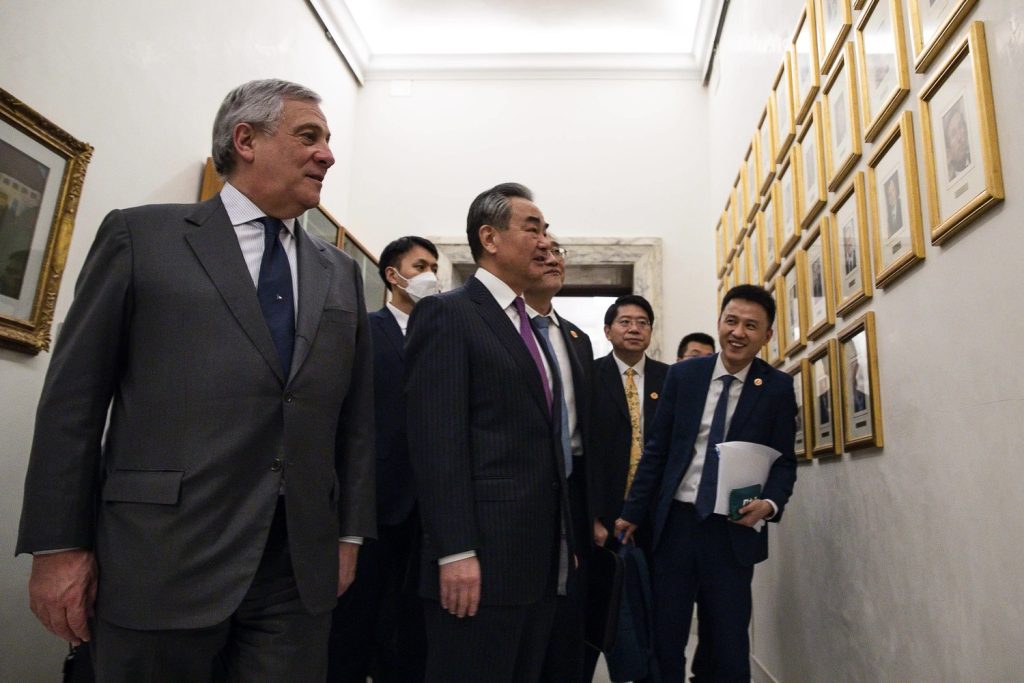
Italy was the only G7 country to officially join China’s Belt and Road Initiative. Now, Rome may soon publicly back out. The cooperation agreement, a Memorandum of Understanding (MoU), expires in March 2024, in just over a year. The government of right-wing populist Prime Minister Giorgia Meloni must therefore consider whether to quietly continue the agreement – or to openly break with Beijing.
The MoU was signed for a period of five years. The agreement states that it “will be automatically extended for subsequent five-year periods and so forth unless terminated by either Party by giving the other Party a written notice at least three months in advance”. This means: By Christmas this year, the government in Rome will already have to decide whether to renew the agreement signed in March 2019. Italy’s BRI exit would mean a strong political signal for the European Union – and would most likely trigger a negative response from Beijing.
The other option would be for Meloni to sweep the matter under the carpet and simply allow the agreement to continue automatically without much fuss, to avoid tensions. Rome could theoretically ignore the MoU: Since the cooperation agreement “does not constitute an international agreement which may lead to rights and obligations under international law”, Italy is actually on the safe side.
But why renew an agreement that has not produced many results so far? Among other things, Italy agreed with Beijing to improve connectivity between the two countries. To this end, the two countries were supposed to work together with the AIIB to fund various projects. The focus was on connecting the Italian transport system and also the Trans-European Network with the New Silk Road.
Although letters of intent were signed between the China Communications Construction Company (CCCC) and the ports of Trieste and Genoa, these did not produce any concrete results. The highly publicized construction of a terminal under Chinese management in the port of Vado Ligure near Genoa originated from an older agreement from 2016, namely the founding of the joint venture APM Terminals Vado Ligure Spa, in which Cosco and Qingdao Port are involved instead of CCCC.
The cooperation between the Italian Space Agency and the Chinese National Space Administration for the China Seismo-Electromegnatic Satellite 02 mission also pre-dates the BRI deal.
There have been more achievements in soft power areas rather than hard infrastructure: For example, Italy returned 796 archaeological artifacts to China as part of the MoU. There was also a collaboration between the Italian Trade Agency (ITA) and Alibaba Group to create an Italian version of the shopping platform. Italy’s news agency Ansa and China’s state agency had agreed to work together.
When Mario Draghi took office in February 2021, however, the winds of China policy changed significantly: Draghi not only terminated the Ansa-Xinhua cooperation. His government also increasingly applied the “golden power” rule. It allows the Italian government a certain say in company acquisitions in strategically important sectors such as banking, technology, medicine or telecommunication.
When Meloni moved into the Palazzo Chigi, there was at first some confusion as to how the right-wing populist would shape the country’s foreign policy vis-à-vis China. During the election campaign in autumn, she already called the MoU “a big mistake”. Then in November, Defense Minister Guido Crosetto stressed that it was “unlikely” that the Italian side would renew the agreement. “We will remain consistent with what we said when others wanted to sign that memorandum,” Crosetto said. He was referring to the position of the Fratelli d’Italia party, which he and Meloni founded and which sharply criticized the MoU in 2019.
But Beijing will not give up on the project so easily and is staying on the ball. The New Silk Road, for example, is one of the key topics for the new Chinese ambassador in Rome, Jia Guide. The 56-year-old theoretically has the diplomatic skills to convince Italy not to abandon the cooperation agreement. Between 2015 and 2019, Jia served as Chinese ambassador to Peru – and during his tenure in Lima, the government joined the BRI despite initial skepticism.
Jia’s career is remarkable. He has been working for Chinese diplomacy since the 1990s, moving between various positions in the Ministry of Foreign Affairs in Beijing and posts abroad. Before moving to Italy, he was the director of the Beijing Department of Legal Affairs for foreign affairs and international law.
Jia now comes to Rome with a carrot and a stick. “I believe that two great nations like ours have the skills and wisdom necessary to make the right decisions throughout history so that this path of cooperation and friendship can become ever wider,” Jia said in his first interview with Ansa.
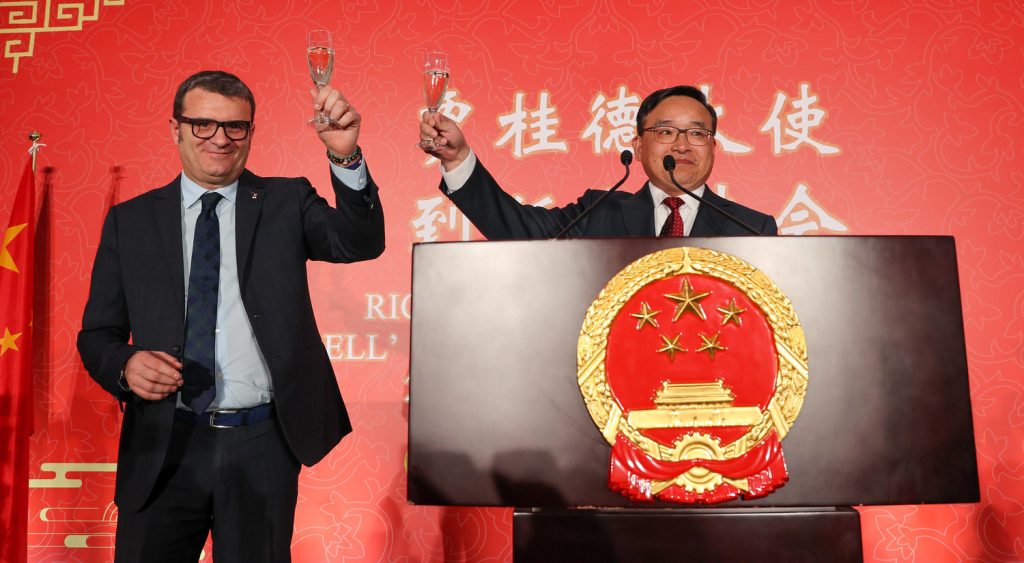
He made it clear what was at stake for Italy: China had maintained its position as Italy’s leading trading partner in Asia despite the Covid pandemic, Jia stressed. As far as the MoU is concerned, critical rhetoric should rather give way to facts, Jia said.
Convincing is also being done from much higher places: Foreign Policy Czar Wang Yi is said to have addressed the renewal of the MoU during his visit to Italy over a week and a half ago. In talks with Italian Foreign Minister Antonio Tajani, “bilateral agreements” were also discussed, it was said after the meeting.
But there is another level higher: Meloni was personally invited to Beijing by China’s head of state Xi Jinping at the G20 meeting in Bali. A date for the trip has not yet been set. But the topic will certainly be on the agenda at a possible summit.
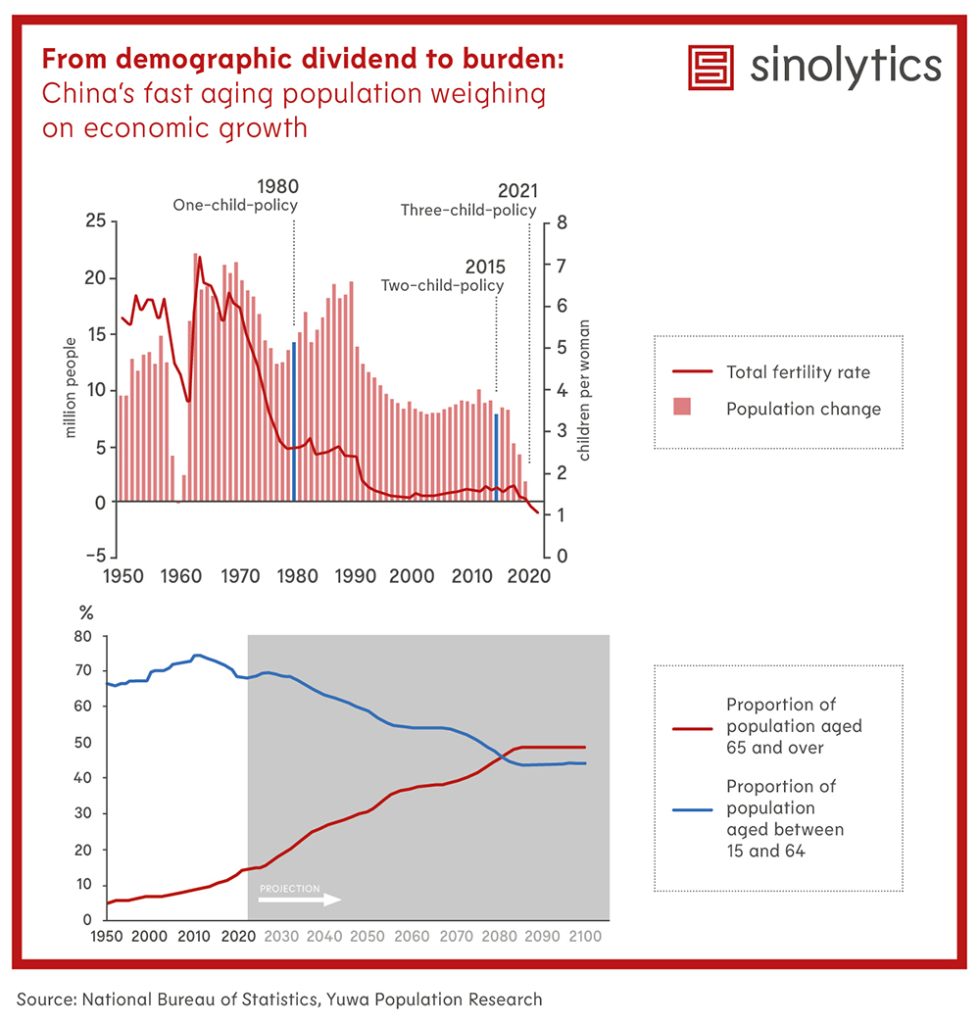
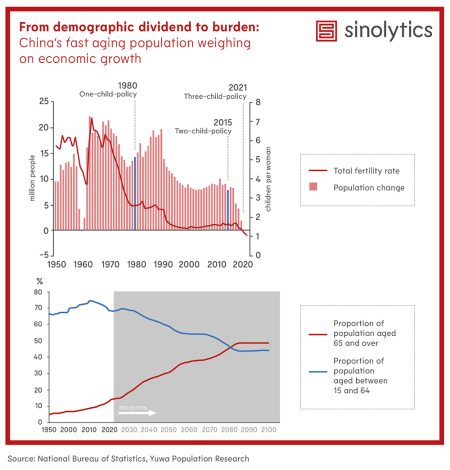
Sinolytics is a European research-based consultancy entirely focused on China. It advises European companies on their strategic orientation and concrete business activities in the People’s Republic.
The head of Volkswagen China, Ralf Brandstaetter, visited the company’s controversial plant in Xinjiang in mid-February. Now he rejects criticism of the German corporation’s involvement in the Uyghur region. “We have no evidence of human rights violations at this plant,” he said, according to news reports. The management is striving for a good working atmosphere, he said.
VW will continue to hold on to the site, Brandstaetter emphasized. China would expect a global company to honor its contracts. However, he took the critical reports about the conditions in Xinjiang “very seriously”.
The accusation that human rights are being violated directly on VW’s premises has never been made. The criticism concerns the fact that the presence of a partly state-owned German company contributes to the legitimization of Chinese policy in the Muslim-majority region. The government is using brutal methods to suppress the culture of the Uyghur people there. fin
Real per capita consumer spending in China fell by 0.2 percent last year. This was reported by the National Bureau of Statistics on Tuesday. Reportedly, the strict pandemic control measures were to blame, as they have curbed consumer spending. It is only the third such decline since record-keeping began in 1980. China last saw a similar drop in 2020 during the first phase of the Covid pandemic, back then of as much as four percent. In 2021, the economy recovered, and with it, per capita spending by 12.6 percent.
China’s economy grew by only a meager three percent in 2022. As a result, real incomes rose by only 2.9 percent, the second-lowest increase since 1989. According to the data, unadjusted per capita income was 36,883 yuan (5,310 US dollars) in 2022, while per capita spending rose to 24,538 yuan (3,533 US dollars). Retail sales declined by 0.2 percent, the second-worst performance since 1968.
Rural areas performed better than urban areas: The real incomes of rural households grew by 4.2 percent over the course of the year, while in urban areas they grew by only 1.9 percent. However, the incomes of urban and rural residents grew much slower in 2022 than the year before. In 2021, the incomes of urban residents had increased by 7.7 percent and of rural households by 9.7 percent. rtr
The intelligence chief of the Ukrainian Defense Ministry Kyrylo Budanov currently sees no indication of possible Chinese arms deliveries to Russia. “I do not think that China will agree to the supply of weapons to Russia,” he told the US radio station Voice of America in an interview broadcast on Monday. “I see no indication that such things are even being negotiated.” About the corresponding accusations from the US, Budanov said: “I do not see such facts.”
According to AFP, US intelligence chief William Burns reiterated over the weekend that Washington was “convinced” that Beijing was at least considering supplying weapons to Russia for the Ukraine war. According to a Wall Street Journal report, China is considering supplying drones and munitions. But experts also believe individual companies or militaries in China may be individually thinking about it. Beijing denies plans to supply weapons to Russia. ck
China’s Ministry of Industry and Information Technology (MIIT) issued rules against “extortionate practices through mobile apps“. According to the regulations issued on Monday, practices like automatic subscription renewals without user consent will be punished more severely in the future.
Furthermore, Beijing plans to regulate short video apps more closely, primarily in an attempt to counter addictive behavior among the youth. China wants to create a “clean space for short videos, improve youth protection, and play a subtle and positive role in education and trend development,” according to a statement issued by the National Radio and Television Administration (NRTA) earlier this week. Details are not yet known.
China’s media regulators had already significantly tightened the rules for live streaming, video games and Internet use for minors in 2022. Children and young people under the age of 18 are officially only allowed to use certain services for three hours a week to avoid becoming addicted to gaming.
The authority’s new plans could primarily affect the popular short video platform Douyin. Its parent company ByteDance also owns the highly popular app TikTok. Unlike TikTok, Douyin introduced a “teen mode” in 2021. Users under 14 can only use the app in this mode for up to 40 minutes per day between 6 a.m. and 10 p.m. Endless scrolling is interrupted by 5-second delays. Douyin also displays only selected “inspirational” content to young users, such as scientific, educational and historical content. fpe
After almost 1,000 days, masks are no longer mandatory in Hong Kong as of today, Wednesday. As the government of the special administrative region announced on Tuesday, masks only have to be worn in certain facilities such as hospitals and nursing homes. Thus, one of the last bastions in Asia ends the strict mask requirement.
Neighboring Macao lifted the mask mandate on Feb. 26, and Taiwan did so last week. The people of mainland China are also no longer required to wear masks outdoors. However, the authorities of the People’s Republic still require wearing a mask in public buildings.
During the COVID-19 pandemic, Hong Kong had one of the world’s strictest mask mandates. People caught without mouth-nose protection on the street or in public buildings, for example, faced a fine of up to the equivalent of 600 euros. Even small children as young as two years old had to wear masks. fpe

There is usually very little talk about China from German trade unionists. Wolfgang Mueller was an exception. For 14 years, he advised Siemens, Schaeffler and other companies involved in China at the German metalworkers’ union IG Metall – and built up a network for works councils at companies with Chinese involvement. But where did a man from the Catholic town of Eichsfeld in Lower Saxony get this China expertise?
In the late 1960s, Mueller studied social sciences in Goettingen and Constance, joined grassroots groups and eventually went on to work as a research assistant at the universities of Bremen and Oldenburg. A few years later, his university career ended abruptly: Ernst Albrecht, then prime minister of Lower Saxony, banned him from his profession. He had run for the German Bundestag elections for the Communist League of West Germany (KBW).
At that time, KBW took advantage of Mueller’s professional predicament and sent him to Beijing – as a liaison to the CP. “I had hardly any interest in China before, I didn’t speak a single word of Chinese,” he recalls. Once in China, there was little to do as a KBW liaison. So Mueller worked full-time for several years in the German editorial department of Radio Beijing. “The years in China shaped me and mean a lot to me,” he says today. “I was lucky enough to experience the transition from the time of the Cultural Revolution to the opening-up policy. It was an exciting time.”
Back in Germany, Mueller worked as a software developer and works council member for American computer companies until IG Metall called him in 1999. At the time, the union’s main concern was the relocation of jobs to China. “But that has changed,” Mueller says – in part because of the work by council members like him, who provide a different perspective on China. “The union members understand that good China relations are of enormous importance for the German industry.”
Since his retirement in 2014, Mueller has been working as a consultant for employee representatives and supervisory boards: “For example, when Chinese investors are planning takeovers or management is discussing a new China strategy.” Along the way, he has written several books about China; his latest is titled “China: neuer Hauptfeind des Westens?” (China: New main enemy of the West?); it will be published by VSA Verlag in the spring. In it, he explores the question of whether China is acting responsibly as a great power. “For me, a responsible approach to this position as the largest economic power means, for example: no unequal treaties with other countries; no interference in internal affairs; no hegemonic policy.”
And why is there a need for such a book? “Because the dominant China discourse is somewhat hysterical and unfortunately quite fact-free,” Mueller believes. Svenja Napp
Jürgen Pietsch has been Senior Manager Battery Industrialization at Daimler China since February. For his post, Pietsch moved from Stuttgart to Zhenjiang in the province of Jiangsu. This is not his first assignment in China. Between 2016 and 2020, the engineer already worked as a technical project manager at Daimler’s RD Tech Center in Beijing.
Axel Barth has taken over the position of General Manager China Projects & Technical Project Management Touareg at VW. Barth’s responsibilities include the management and implementation of China-specific vehicle construction regulations and the bundling of various specialist groups for technical implementation. Barth is currently working from Wolfsburg. However, he has already spent seven years for VW in Chengdu and Beijing.
Is something changing in your organization? Let us know at heads@table.media!
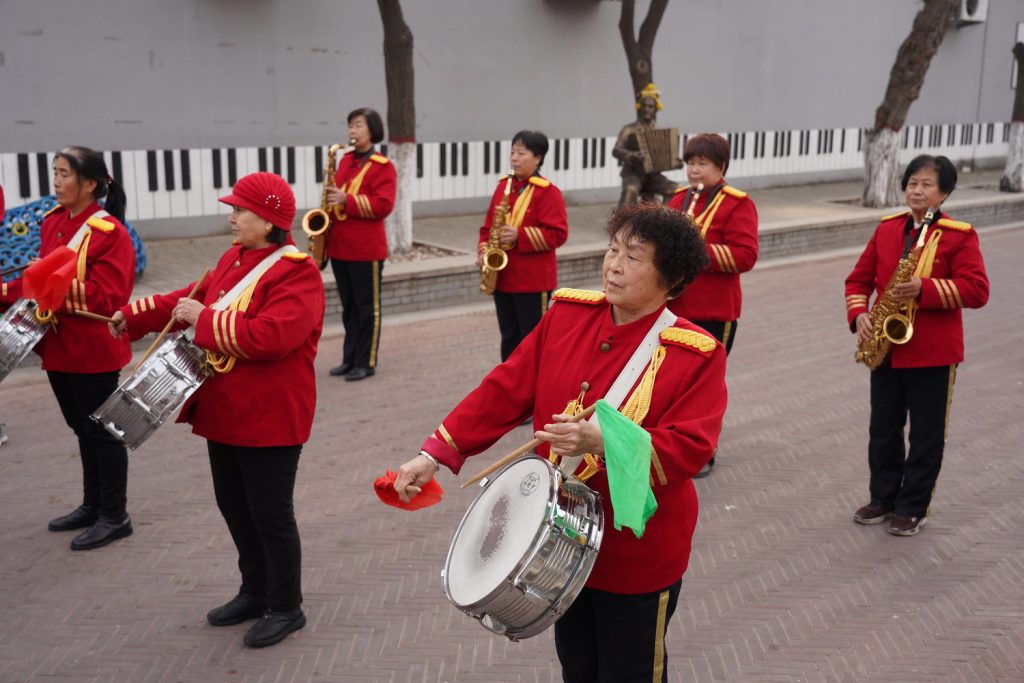
The residents of the village of Zhouwo in the northern Chinese region of Wuqiang perform at the music festival. The small village with 900 inhabitants is known for its “music industry”. Over 60 instrument manufacturers have settled here. More than 10,000 people work in the factories, which ship their timpani and trombones all over the world.
China is the world’s largest emitter of harmful greenhouse gasses. So the news that the country is currently building dozens of new coal-fired power plants is a cause for concern. However, the massive addition of new power plants does not necessarily mean a turn away from climate action and a rapid increase in Chinese emissions, analyses Nico Beckert.
More power plants naturally increase the risk that Beijing will miss its own climate targets. But a new study suggests that China’s specific situation will prevent the worst from happening. For example, many coal-fired power plants are already underutilized, and some projects serve primarily as employment programs for the ailing construction sector.
Infrastructure projects such as power plants are also characteristic of the Chinese Belt and Road Initiative (BRI), also known as the New Silk Road. China uses this mammoth project to fund projects all over the world – including in Europe. Most of these are stand-alone projects, but in 2019 Italy became the first and only G7 country to sign a cooperation deal with the BRI.
The new Prime Minister Giorgia Meloni, however, is not a fan of the infrastructure program. She plans to quit the partnership with China, reports Amelie Richter. The decision is expected later this year.


It is a construction boom that is unimaginable by Western standards. In 2022, China started building a new coal-fired power plant every week on average: The construction of 50 gigawatts of new power plant capacity has commenced. In total, the authorities approved coal-fired power plants with a capacity of 106 gigawatts last year, about 100 large coal plants. A fourfold increase compared to 2021, according to a new study by the Global Energy Monitor (GEM) and the Centres for Research on Energy and Clean Air (CREA). In the same period, only 4.1 gigawatts of power plant capacity were decommissioned.
This construction boom sounds like a killing blow to China’s climate goals, and it also puts international efforts in jeopardy. China’s President Xi Jinping promised a decrease in coal consumption starting somewhere between 2026 and 2030. At first glance, this hardly seems possible given the massive expansion of power plant capacity. But the situation is not that simple. “The massive additions of new coal-fired capacity don’t necessarily mean that coal use or CO2 emissions from the power sector will increase in China,” the study’s authors write.
Some factors unique to China speak against a sharp increase in carbon emissions:
Nevertheless, the construction boom does not come without climate risks. More than 100 new coal-fired power plants “will make meeting China’s climate commitments more complicated and costly”, the GMA-CREA study concludes. The coal industry has great political influence. It directly or indirectly provides several million jobs and is one of the largest taxpayers in some provinces.
The authors of the study fear that in the worst case, the new coal power plants will be fully utilized and will slow down the expansion of renewables. This could sharply increase China’s emissions. The political leeway for this does partly exist.
Although Xi Jinping has promised to reduce coal use and reach the carbon peak in 2030, the absolute level of carbon emissions has not been defined. At the same time, the leadership is aware, however, that meeting the long-term climate goals will be harder to achieve if emissions continue to rise sharply until 2030.
The new coal-fired power plants, however, do not only function as an economic stimulus program to achieve rapid growth and support the country’s ailing construction sector. Another argument for the construction boom is to secure the energy supply:

Italy was the only G7 country to officially join China’s Belt and Road Initiative. Now, Rome may soon publicly back out. The cooperation agreement, a Memorandum of Understanding (MoU), expires in March 2024, in just over a year. The government of right-wing populist Prime Minister Giorgia Meloni must therefore consider whether to quietly continue the agreement – or to openly break with Beijing.
The MoU was signed for a period of five years. The agreement states that it “will be automatically extended for subsequent five-year periods and so forth unless terminated by either Party by giving the other Party a written notice at least three months in advance”. This means: By Christmas this year, the government in Rome will already have to decide whether to renew the agreement signed in March 2019. Italy’s BRI exit would mean a strong political signal for the European Union – and would most likely trigger a negative response from Beijing.
The other option would be for Meloni to sweep the matter under the carpet and simply allow the agreement to continue automatically without much fuss, to avoid tensions. Rome could theoretically ignore the MoU: Since the cooperation agreement “does not constitute an international agreement which may lead to rights and obligations under international law”, Italy is actually on the safe side.
But why renew an agreement that has not produced many results so far? Among other things, Italy agreed with Beijing to improve connectivity between the two countries. To this end, the two countries were supposed to work together with the AIIB to fund various projects. The focus was on connecting the Italian transport system and also the Trans-European Network with the New Silk Road.
Although letters of intent were signed between the China Communications Construction Company (CCCC) and the ports of Trieste and Genoa, these did not produce any concrete results. The highly publicized construction of a terminal under Chinese management in the port of Vado Ligure near Genoa originated from an older agreement from 2016, namely the founding of the joint venture APM Terminals Vado Ligure Spa, in which Cosco and Qingdao Port are involved instead of CCCC.
The cooperation between the Italian Space Agency and the Chinese National Space Administration for the China Seismo-Electromegnatic Satellite 02 mission also pre-dates the BRI deal.
There have been more achievements in soft power areas rather than hard infrastructure: For example, Italy returned 796 archaeological artifacts to China as part of the MoU. There was also a collaboration between the Italian Trade Agency (ITA) and Alibaba Group to create an Italian version of the shopping platform. Italy’s news agency Ansa and China’s state agency had agreed to work together.
When Mario Draghi took office in February 2021, however, the winds of China policy changed significantly: Draghi not only terminated the Ansa-Xinhua cooperation. His government also increasingly applied the “golden power” rule. It allows the Italian government a certain say in company acquisitions in strategically important sectors such as banking, technology, medicine or telecommunication.
When Meloni moved into the Palazzo Chigi, there was at first some confusion as to how the right-wing populist would shape the country’s foreign policy vis-à-vis China. During the election campaign in autumn, she already called the MoU “a big mistake”. Then in November, Defense Minister Guido Crosetto stressed that it was “unlikely” that the Italian side would renew the agreement. “We will remain consistent with what we said when others wanted to sign that memorandum,” Crosetto said. He was referring to the position of the Fratelli d’Italia party, which he and Meloni founded and which sharply criticized the MoU in 2019.
But Beijing will not give up on the project so easily and is staying on the ball. The New Silk Road, for example, is one of the key topics for the new Chinese ambassador in Rome, Jia Guide. The 56-year-old theoretically has the diplomatic skills to convince Italy not to abandon the cooperation agreement. Between 2015 and 2019, Jia served as Chinese ambassador to Peru – and during his tenure in Lima, the government joined the BRI despite initial skepticism.
Jia’s career is remarkable. He has been working for Chinese diplomacy since the 1990s, moving between various positions in the Ministry of Foreign Affairs in Beijing and posts abroad. Before moving to Italy, he was the director of the Beijing Department of Legal Affairs for foreign affairs and international law.
Jia now comes to Rome with a carrot and a stick. “I believe that two great nations like ours have the skills and wisdom necessary to make the right decisions throughout history so that this path of cooperation and friendship can become ever wider,” Jia said in his first interview with Ansa.

He made it clear what was at stake for Italy: China had maintained its position as Italy’s leading trading partner in Asia despite the Covid pandemic, Jia stressed. As far as the MoU is concerned, critical rhetoric should rather give way to facts, Jia said.
Convincing is also being done from much higher places: Foreign Policy Czar Wang Yi is said to have addressed the renewal of the MoU during his visit to Italy over a week and a half ago. In talks with Italian Foreign Minister Antonio Tajani, “bilateral agreements” were also discussed, it was said after the meeting.
But there is another level higher: Meloni was personally invited to Beijing by China’s head of state Xi Jinping at the G20 meeting in Bali. A date for the trip has not yet been set. But the topic will certainly be on the agenda at a possible summit.


Sinolytics is a European research-based consultancy entirely focused on China. It advises European companies on their strategic orientation and concrete business activities in the People’s Republic.
The head of Volkswagen China, Ralf Brandstaetter, visited the company’s controversial plant in Xinjiang in mid-February. Now he rejects criticism of the German corporation’s involvement in the Uyghur region. “We have no evidence of human rights violations at this plant,” he said, according to news reports. The management is striving for a good working atmosphere, he said.
VW will continue to hold on to the site, Brandstaetter emphasized. China would expect a global company to honor its contracts. However, he took the critical reports about the conditions in Xinjiang “very seriously”.
The accusation that human rights are being violated directly on VW’s premises has never been made. The criticism concerns the fact that the presence of a partly state-owned German company contributes to the legitimization of Chinese policy in the Muslim-majority region. The government is using brutal methods to suppress the culture of the Uyghur people there. fin
Real per capita consumer spending in China fell by 0.2 percent last year. This was reported by the National Bureau of Statistics on Tuesday. Reportedly, the strict pandemic control measures were to blame, as they have curbed consumer spending. It is only the third such decline since record-keeping began in 1980. China last saw a similar drop in 2020 during the first phase of the Covid pandemic, back then of as much as four percent. In 2021, the economy recovered, and with it, per capita spending by 12.6 percent.
China’s economy grew by only a meager three percent in 2022. As a result, real incomes rose by only 2.9 percent, the second-lowest increase since 1989. According to the data, unadjusted per capita income was 36,883 yuan (5,310 US dollars) in 2022, while per capita spending rose to 24,538 yuan (3,533 US dollars). Retail sales declined by 0.2 percent, the second-worst performance since 1968.
Rural areas performed better than urban areas: The real incomes of rural households grew by 4.2 percent over the course of the year, while in urban areas they grew by only 1.9 percent. However, the incomes of urban and rural residents grew much slower in 2022 than the year before. In 2021, the incomes of urban residents had increased by 7.7 percent and of rural households by 9.7 percent. rtr
The intelligence chief of the Ukrainian Defense Ministry Kyrylo Budanov currently sees no indication of possible Chinese arms deliveries to Russia. “I do not think that China will agree to the supply of weapons to Russia,” he told the US radio station Voice of America in an interview broadcast on Monday. “I see no indication that such things are even being negotiated.” About the corresponding accusations from the US, Budanov said: “I do not see such facts.”
According to AFP, US intelligence chief William Burns reiterated over the weekend that Washington was “convinced” that Beijing was at least considering supplying weapons to Russia for the Ukraine war. According to a Wall Street Journal report, China is considering supplying drones and munitions. But experts also believe individual companies or militaries in China may be individually thinking about it. Beijing denies plans to supply weapons to Russia. ck
China’s Ministry of Industry and Information Technology (MIIT) issued rules against “extortionate practices through mobile apps“. According to the regulations issued on Monday, practices like automatic subscription renewals without user consent will be punished more severely in the future.
Furthermore, Beijing plans to regulate short video apps more closely, primarily in an attempt to counter addictive behavior among the youth. China wants to create a “clean space for short videos, improve youth protection, and play a subtle and positive role in education and trend development,” according to a statement issued by the National Radio and Television Administration (NRTA) earlier this week. Details are not yet known.
China’s media regulators had already significantly tightened the rules for live streaming, video games and Internet use for minors in 2022. Children and young people under the age of 18 are officially only allowed to use certain services for three hours a week to avoid becoming addicted to gaming.
The authority’s new plans could primarily affect the popular short video platform Douyin. Its parent company ByteDance also owns the highly popular app TikTok. Unlike TikTok, Douyin introduced a “teen mode” in 2021. Users under 14 can only use the app in this mode for up to 40 minutes per day between 6 a.m. and 10 p.m. Endless scrolling is interrupted by 5-second delays. Douyin also displays only selected “inspirational” content to young users, such as scientific, educational and historical content. fpe
After almost 1,000 days, masks are no longer mandatory in Hong Kong as of today, Wednesday. As the government of the special administrative region announced on Tuesday, masks only have to be worn in certain facilities such as hospitals and nursing homes. Thus, one of the last bastions in Asia ends the strict mask requirement.
Neighboring Macao lifted the mask mandate on Feb. 26, and Taiwan did so last week. The people of mainland China are also no longer required to wear masks outdoors. However, the authorities of the People’s Republic still require wearing a mask in public buildings.
During the COVID-19 pandemic, Hong Kong had one of the world’s strictest mask mandates. People caught without mouth-nose protection on the street or in public buildings, for example, faced a fine of up to the equivalent of 600 euros. Even small children as young as two years old had to wear masks. fpe

There is usually very little talk about China from German trade unionists. Wolfgang Mueller was an exception. For 14 years, he advised Siemens, Schaeffler and other companies involved in China at the German metalworkers’ union IG Metall – and built up a network for works councils at companies with Chinese involvement. But where did a man from the Catholic town of Eichsfeld in Lower Saxony get this China expertise?
In the late 1960s, Mueller studied social sciences in Goettingen and Constance, joined grassroots groups and eventually went on to work as a research assistant at the universities of Bremen and Oldenburg. A few years later, his university career ended abruptly: Ernst Albrecht, then prime minister of Lower Saxony, banned him from his profession. He had run for the German Bundestag elections for the Communist League of West Germany (KBW).
At that time, KBW took advantage of Mueller’s professional predicament and sent him to Beijing – as a liaison to the CP. “I had hardly any interest in China before, I didn’t speak a single word of Chinese,” he recalls. Once in China, there was little to do as a KBW liaison. So Mueller worked full-time for several years in the German editorial department of Radio Beijing. “The years in China shaped me and mean a lot to me,” he says today. “I was lucky enough to experience the transition from the time of the Cultural Revolution to the opening-up policy. It was an exciting time.”
Back in Germany, Mueller worked as a software developer and works council member for American computer companies until IG Metall called him in 1999. At the time, the union’s main concern was the relocation of jobs to China. “But that has changed,” Mueller says – in part because of the work by council members like him, who provide a different perspective on China. “The union members understand that good China relations are of enormous importance for the German industry.”
Since his retirement in 2014, Mueller has been working as a consultant for employee representatives and supervisory boards: “For example, when Chinese investors are planning takeovers or management is discussing a new China strategy.” Along the way, he has written several books about China; his latest is titled “China: neuer Hauptfeind des Westens?” (China: New main enemy of the West?); it will be published by VSA Verlag in the spring. In it, he explores the question of whether China is acting responsibly as a great power. “For me, a responsible approach to this position as the largest economic power means, for example: no unequal treaties with other countries; no interference in internal affairs; no hegemonic policy.”
And why is there a need for such a book? “Because the dominant China discourse is somewhat hysterical and unfortunately quite fact-free,” Mueller believes. Svenja Napp
Jürgen Pietsch has been Senior Manager Battery Industrialization at Daimler China since February. For his post, Pietsch moved from Stuttgart to Zhenjiang in the province of Jiangsu. This is not his first assignment in China. Between 2016 and 2020, the engineer already worked as a technical project manager at Daimler’s RD Tech Center in Beijing.
Axel Barth has taken over the position of General Manager China Projects & Technical Project Management Touareg at VW. Barth’s responsibilities include the management and implementation of China-specific vehicle construction regulations and the bundling of various specialist groups for technical implementation. Barth is currently working from Wolfsburg. However, he has already spent seven years for VW in Chengdu and Beijing.
Is something changing in your organization? Let us know at heads@table.media!

The residents of the village of Zhouwo in the northern Chinese region of Wuqiang perform at the music festival. The small village with 900 inhabitants is known for its “music industry”. Over 60 instrument manufacturers have settled here. More than 10,000 people work in the factories, which ship their timpani and trombones all over the world.
